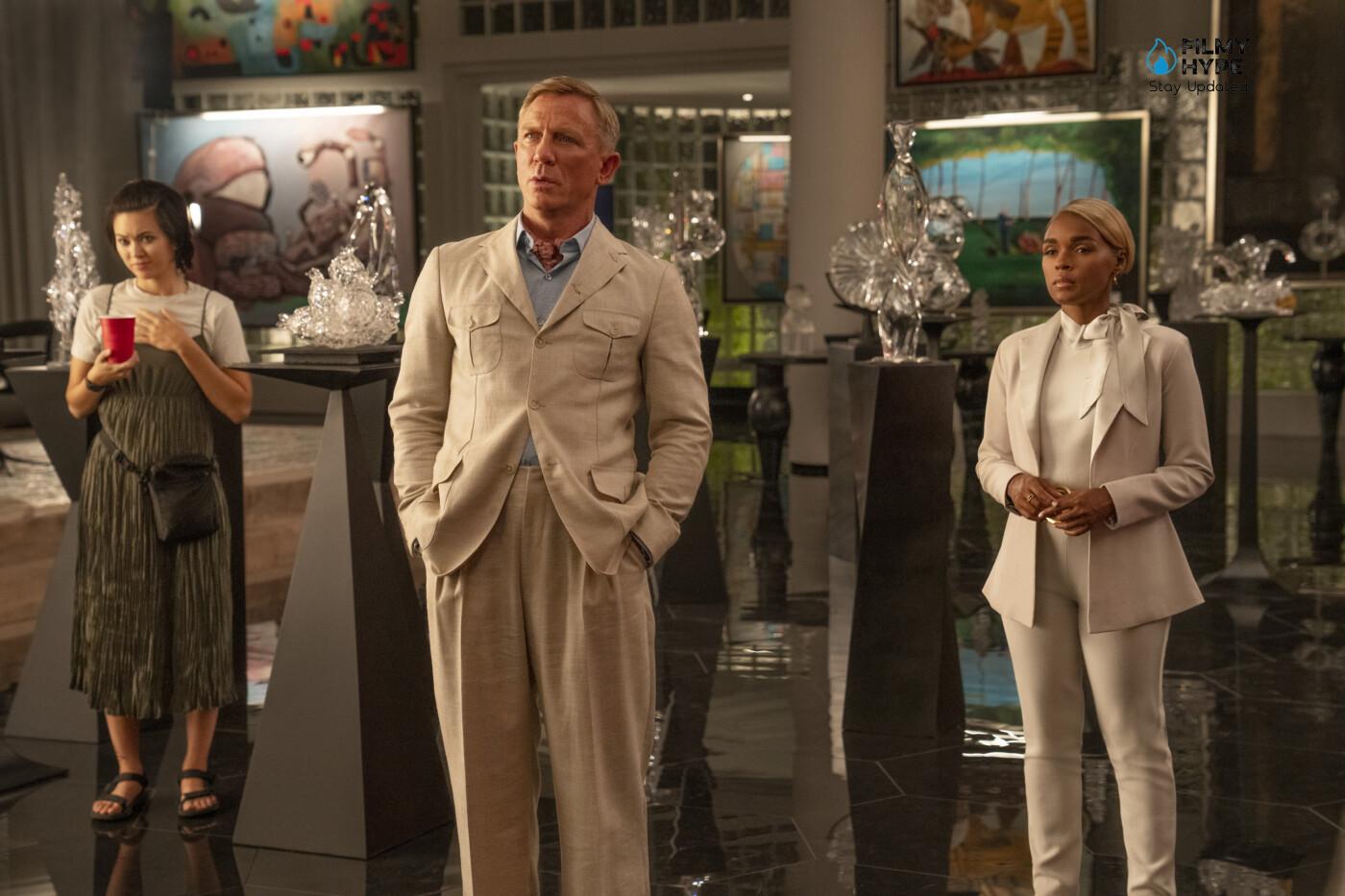Glass Onion: A Knives Out Mystery Review: An Equally Brilliant Sequel, Even More Amused and Entertaining In Its Analysis
Cast: Daniel Craig, Edward Norton, Janelle Monáe, Kathryn Hahn, Leslie Odom Jr., Jessica Henwick, Madelyn Cline, Kate Hudson, Dave Bautista
Director: Rian Johnson
Filmyhype.com Ratings: 4.5/5 (four and a half stars)
After the success of Knives Out, the wait was great for the second chapter Glass Onion: A Knives Out Mystery, which had its world premiere at the Toronto International Film Festival and will make other passages in the room before landing on Netflix, which has bought the rights for the two sequels of the Rian Johnson mystery released in 2019. And the contribution of the streaming company, as we will try to explain in this review of Glass Onion – Knives Out (in marketing, but not in the credits of the film itself, there is the subtitle A Knives Out Mystery), is both flashy and paradoxical.

Rian Johnson has warned us from the beginning of Knives Out when the writing on a cup that reads: “My house, my rules“ is framed. Of course, this is the first clue to the detective plot that will unfold, but it also clearly expresses the director’s intention. If you don’t like the rules of the genre that he is preparing to rewrite, don’t play. Thus, the director of Star Wars: The Last Jedi (2017) and Looper (2012) opens the door to his very personal idea of whodunit which, as we will see in our review of Glass Onion: A Knives Out Mystery is not suitable for purists of the genre or for those who raise their eyebrows when trying to rework cinematographic codes considered untouchable, but for those who are ready to come across a socio-political satire in which we are all possible suspects.
Glass Onion: A Knives Out Mystery Review: The Story Plot
The story takes place in a full pandemic, with everyone affected by the tedium of teleworking and not being able to interact with people as they used to. Benoit Blanc is particularly bored because between lockdowns the number of cases to investigate has dropped considerably. Then, one day, he receives an invitation from an eccentric tycoon, Miles Bron, who annually gathers his best friends and organizes games, based on his passion for puzzles and riddles. This time the date is on his private island in Greece, and the theme of the weekend is murder. Only then the dead man escapes us, and Blanc’s presence turns out to be even more fundamental than expected…
Get ready to immerse yourself in a murder mystery in which every rule of the game is completely overturned: Glass Onion: A Knives Out Mystery, is not limited to just catching the killer, its narrative offers much more. We are facing a socio-political portrait of the United States of 2019, in which the most astute culprits in circulation are class privilege and greed. On the occasion of his 85th birthday, legendary mystery writer Harlan Thrombey (Christopher Plummer) gathered the family together on his country estate to celebrate together. However, the next morning, the housekeeper discovers that Harlan committed suicide by slitting his throat. But how can you be sure that it is suicide?

The investigation into these mysterious circumstances is being conducted by two policemen (Lakeith Stanfield and Noah Segan) and a famous private detective, Benoit Blanc (Daniel Craig), who is hired by a mysterious unidentified client. The three brought together the entire family – played by an all-star cast, Jamie Lee Curtis, Don Johnson, Michael Shannon, Toni Collette and Chris Evans – and Marta Cabrera (Ana de Armas), the Latin nurse who provided home care to Harlan and with whom the elder made a sweet friendship. Thus, the interrogations follow one another under the watchful eyes of the numerous portraits, statues, wood carvings and statuettes of the villa: the old manor is the only one who knows the bad blood that flows between each member of the family.
Glass Onion: A Knives Out Mystery Review and Analysis
Glass Onion: A Knives Out Mystery was one of the most pleasant surprises seen at the cinema in 2019. Armed with undoubted narrative ingenuity and cunning behind the camera, Rian Johnson has succeeded with this film to shape a new cinematic universe, which invention and curiosity are the keys to accessing. The film starts as a twisted game in Cluedo, on the same level as many other examples of the detective genre, but we soon realize that it will subvert its fundamental pillars. The fast pace in which the events follow one another puts the viewers in front of an unprecedented method of investigation, in which the clues are given to us sometimes in an accomplice way, others according to more malicious schemes: we go from being invited to being part of the bizarre plan that feeds the plot of the film at junctures in which we remain as confused as the characters themselves.
Johnson’s script – which entered the shortlist for an Oscar for Best Original Screenplay in 2020 – builds a narrative game that works beautifully. Let’s start with the characters, whose characterization is simply brilliant, halfway between parody and the most recognizable human misery. A mix of frustrations, egos, lies and subterfuges make every position in the Thrombey family a mirror of Trump-era America. This nucleus has its own visual identity – very well represented by the costume department – and is set within the film’s setting, baroque, full of precious details, especially a sculpture of vital importance within the plot and which frames the presentation of each character, rising almost to the emblem of a medieval family.

None of this would have been possible without a cast in a state of grace: everyone has their moments of glory in a cast that borders on chirality. But, without a doubt, the two performances that stand out the most are those of Ana de Armas and Daniel Craig. The young actress managed to make her way to Hollywood thanks to Cena con delitto – Knives Out.
Ana De Armas gives us a layered performance, in which every nuance of her character has a very accurate expressive counterpart; she manages to support the comic side of the play and at the same time defend the more dramatic side of the events, guided by a strong sense of morality, which she contrasts with the piranha pool she has to face. Craig, for his part, is flawless in his reinterpretation of the classic Poirot-Esque detective, a much calmer investigator and – why not – amused by the circumstances in which he finds himself since he is very clear on the difference between law and justice and how the group of suspects relates to these concepts. Combining elegance and fun, we can’t wait to see Benoit Blanc again in Glass Onion – A Knives Out Mystery, a sequel to Glass Onion: A Knives Out Mystery.
Rian Johnson appropriates one of the inviolable assumptions of Edgar Allan Poe’s detective, Auguste Dupin: the idea that the real mystery is (almost) always in plain sight and that the evidence lurks right before our eyes. The investigation proposed by Cena con delitto – Knives Out is not so much a detective one, but an investigation of the linguistic code: is it possible to transfer the dynamics of the murder mystery to a sociological study? The answer is certainly yes, without ever forgetting that cinema is – above all – fun, that comedy can scare more than horror and that there is no more intriguing mystery than human behavior.
During the presentation of the film in Toronto, answering a question from the audience, Rian Johnson specified that the intent of these features is not to be smarter than the viewer, because the moment you start from that assumption the film suffers. From that point of view, the choice of making the victim in the first chapter a crime writer was a way to get our hands on it: it’s just yet another variation on the theme, nothing transcendental. A genre of exercise that primarily wants to entertain.
And it is with this philosophy that Johnson approached the second episode, which in some ways – and the film says so explicitly, starting with the trick that allows the characters to walk around without a mask – is more stupid than the prototype, and precisely for this equally successful. The director does not try to build a more solid or intriguing mystery than in 2019, which paradoxically makes the reflection on the narrative structure even more interesting, exemplified by the title: the glass onion – a real object within the film, whose name comes from a Beatles song – it is something that has various layers, but in reality, it is transparent and everything in it is in front of our eyes.

The main legacy of the first film, apart from the return of Craig who plays amiably, is the satirical analysis of the privileged American who in 2019 shamelessly ridiculed a certain feignedly liberal hypocrisy within a family that was not so much. veiled Trumpian. Here, supported by the financial contribution of Netflix, Johnson presses more generically – but with specific elements such as Covid, YouTube monetization and cancel culture paranoia- on the key of capitalism, staging a group of wealthy friends who claim to be on the side of the people but underneath despise them (the fact that Miles’ opulent home is located in Greece, a country that has been practically synonymous for a decade of economic crisis, says a lot).
It does not try to rewrite the rules, on the contrary: it adheres to the original ones, which three years ago were embodied by the legendary cup of coffee (” My House, My Rules, My Coffee”), updating them just enough to continue to entertain with criteria and ferocity. Without pretending to improve the world, with an honesty that almost all of his characters are magnificently lacking.
Glass Onion: A Knives Out Mystery Review: The Last Words
With a brilliant screenplay and an all-star cast in a state of grace, Rian Johnson has rewritten the formula of the murder mystery and consolidated his authorial poetics: it takes the directorial genius – but also the spectatorial one – to build an excellent entertainment product. Rian Johnson does not try to do better than the first Knives Out, and for this reason, he comes up with an equally brilliant sequel, even more, amused and entertaining in its analysis of the narrative structure of the classic yellow.






